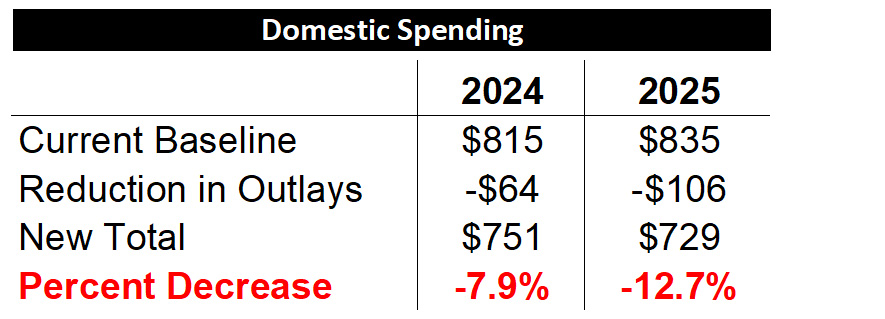The Congressional Budget Office has scored the debt ceiling deal and it's worse than I thought. A big part of the issue is assumptions about inflation:
CBO’s baseline projections for discretionary appropriations are assumed to grow each year with inflation from the amounts provided for the most recent year, whereas CBO’s projections under the [debt ceiling] bill reflect the assumption that funding would be constrained by the caps with authorized adjustments through 2025 and keep pace with inflation thereafter.
In other words, the debt ceiling caps don't account for inflation. Also, I previously looked at the cuts in all discretionary spending, but that's misleading since there's essentially no change in defense spending. The cuts come solely from domestic programs. Here's approximately what that looks like:¹
 If you account only for domestic programs, CBO estimates a reduction of about 8% next year and as much as 13% the year after. Unless I've done my sums wrong, this is truly a gargantuan cut, and far bigger than I originally estimated.
If you account only for domestic programs, CBO estimates a reduction of about 8% next year and as much as 13% the year after. Unless I've done my sums wrong, this is truly a gargantuan cut, and far bigger than I originally estimated.
However, note that there are various side deals that might ameliorate this. Democrats plan to backfill some of the cuts with recissions, and if they're successful the overall cuts in domestic spending will be smaller than CBO estimates.
¹It's approximate because for some reason CBO shows baseline spending in terms of budget authority but it shows cuts in terms of actual outlays. I don't know why, but in any case the difference is small.

It is coming off a historically high base as a % of GDP. I guess if Democrats want to make their gains permanent, they have to win more elections. https://www.cbo.gov/publication/58890
In 2019, non-defense discretionary funding was at $661 billion, so $751 is a $90 increase. Of course, with inflation over that time at ca. 15%, ...
Note: the $661 in discretionary spending was a recent high point. For a table (download): https://www.whitehouse.gov/wp-content/uploads/2023/03/hist08z7_fy2024.xlsx
Why do we need to form a full trifecta to get our priorities enacted, whereas the Republicans just need a single veto point?
Bush got a LOT more out of divided government from '06 to '08 and Trump from '18 to '20 than Obama got from '10 to '16 and and Biden is getting now. We didn't get nothing in those periods. But we got a lot less than Republicans get when things are reversed.
It isn't an historically high spending as a % of GDP since at the end of WWII it was 40% and now it is 24%. According to the CBO after all the changes to the SNAP program are put into effect 78,000 more people will be eligible for SNAP benefits than currently are.
Correct me if I'm wrong, but the budget authority is the "cap" in the next 2 years and the outlays are the effects of the specific program changes, including recission and work requirements.
Recission is when a budget is reduced, i.e. you have to give back funds because you didn't use them. Outlays are what you've spent, i.e. put on a contract, vendor billed and you paid them as the billings were legit.
Yes, but, if the recissions are counted towards the future 2024 budget, doesn't it reduce outlays, rather than reduce the budget authority?
Economists have been able to calculate inflation at different age levels, medical inflation affects the elderly more but housing inflation less. So I’m wondering if there is such thing as government expenditure inflation index that would reflect that inflation impacts it less (or more -but seeing that they are a lot of fix costs I would guess less). Now sadly, a lot of the cuts are for the needy so that impact needs to be analyzed. Another thing to consider is that the government baselines have increased a lot during the Trump-Biden years so maybe the cuts will not have as much of an impact as one imagines. One more factor that is not mentioned, the ongoing automation revolution- many agencies get more efficient as systems get updated (there a lot of obsolete systems out there). Anyways I’m posting this as food for thought but my gut instinct tells the adjusted CBO estimates are hyperbolic, but I could be wrong.
A bunch of automation has occurred in some nooks and crannies of government like DOD and further attempts at automation are planned but the vast number of systems that have to work together means there's still a great need for humans to analyze the data and fix stuff.. Outside the DOD there are still a ton of legacy systems in dire need of funding to upgrade like the IRS for instance. I predict that we'll continue the swap out of clerks for analysts, maybe fewer but higher paid so it might be a wash in terms of $$$ for salary and bennies.
But Democratic leadership assured us that this was a massive win that was both caused by RadicalRepiblicans (Boo!) and the genius of ModerateDemocrats (Yay!).
Weve been told that this deal is better than if there had been no Debt Ceiling Theater. The ExtremistGOP was outfoxed by the daring CentristDems!?
This was a big win if you understand the various political dynamics. But also, it was a big win in pure numbers.
After Repubs won the House it was basically a guarantee that they would be going scorched Earth on the budget this fall and shutting down the government for funzies unless they got draconian cuts. Biden sacrificed the visceral joy of us shoving the 14th Amendment up their butts and instead used the leverage he had in this debt ceiling fight to circumvent what would certainly have been a much worse budget deal later.